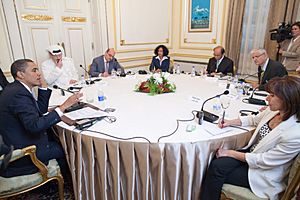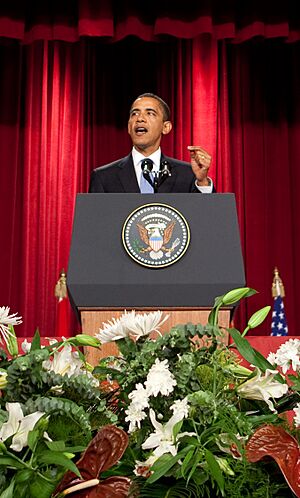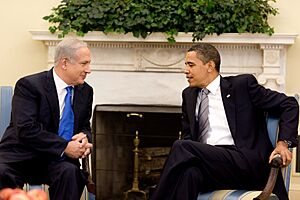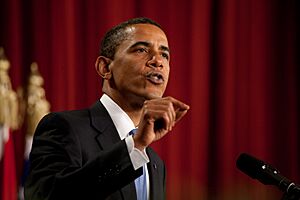A New Beginning (speech) facts for kids
"A New Beginning" was a famous speech given by United States President Barack Obama. He delivered it on June 4, 2009, at Cairo University in Egypt. Al-Azhar University also helped host this important event. Obama had promised during his 2008 election campaign to speak to the Muslim world from a major Muslim city.
The White House chose Egypt because it is a very important country in the Arab world. Egypt also plays a key role in the Middle East peace process. It receives a lot of help from America. Reporters said the speech aimed to fix the relationship between the United States and the Muslim world. This relationship had become difficult during the time of President George W. Bush.
Contents
Why This Speech Was Important
Starting Fresh with the Muslim World
When President Obama first took office on January 20, 2009, he wanted to reach out to the Muslim world. He spoke about finding "a new way forward." This new way would be based on respect and shared interests. He also said he would work with leaders who were willing to change.
Obama's very first interview as president was with an Arab TV channel called Al Arabiya. He told them that Americans were not enemies of the Muslim world. He wanted to discuss important issues like violent extremism and the Israeli-Palestinian conflict. He also hoped to find new ways for countries to work together.
Working Towards Peace
After becoming president, Obama supported the idea of creating a Palestinian state. He also announced that he would talk with Iran. He disagreed with new Israeli settlements and wanted to restart peace talks.
On March 19, Obama sent a special video message for Nowruz (Persian New Year) to the people of Iran. This was another way he tried to connect with the Muslim world. His first trip to a Muslim majority country was to Turkey in April. He spoke to the Turkish Parliament, and many Arab governments liked his speech.
Meeting with Leaders
President Obama met with many leaders before his Cairo speech. He talked with King Abdullah of Jordan and Israeli President Shimon Peres. He also met with Israeli Prime Minister Benjamin Netanyahu at the White House. They discussed the Israeli–Palestinian conflict and settlements in the West Bank.
Obama believed a "two-state solution" was very important. This means having both an Israeli state and a Palestinian state living side-by-side. Netanyahu did not fully agree with creating a Palestinian state at that time. Obama wanted settlement growth to stop, but Netanyahu said Israel had the right to continue them.
Obama also met with Mahmoud Abbas, the Palestinian leader. He repeated his support for a two-state solution. He stressed that Israel needed to stop settlement growth. This would help create a strong Palestinian state.

The Speech in Cairo
Getting Ready for the Speech
In May 2009, President Obama decided to give his speech in Cairo, Egypt. He believed that problems between the Muslim world and the West came from past issues like colonialism. He also felt that the West and Islam were not completely separate. They shared common values, like love for God and family. Obama wanted to include Islam's important contributions and talk about gender equality in his speech.
Several cities were considered for the speech, including Jakarta, Rabat, Amman, and Istanbul. Cairo University was very proud to host the president. They even made some changes to the college and moved some final exams.
Before the Big Day
On his way to Cairo, Obama stayed with King Abdullah of Saudi Arabia. They talked about peace and money matters.
On the day of the speech, Obama met with Egyptian President Hosni Mubarak. They discussed the Israeli-Palestinian conflict. Obama said the U.S. wanted to work with Middle Eastern countries. Before his speech, Obama also visited the Sultan Hassan Mosque.
What Obama Talked About
The speech covered seven main topics:
- Stopping violent extremism.
- The Israeli–Palestinian conflict.
- Nuclear weapons (mentioning Iran).
- Democracy.
- Religious freedom.
- Women's rights.
- Economic development.
Obama's speech called for better understanding between the Islamic world and the West. He said everyone should do more to fight violent extremism. He confirmed America's strong friendship with Israel, calling their bond "unbreakable." However, he also said that Palestinians not having a state was "intolerable." He recognized their wish for a state and dignity, just like Israel's wish for a Jewish homeland.
Obama started his speech by looking for common ground. He quoted from the Quran, saying, "Be conscious of God and always speak the truth." He talked about how Muslims helped Western civilization. He mentioned the start of algebra, new navigation tools, the invention of the fountain pen, and the influence of Islamic architecture.
He also shared his own experiences with Islam. He had Muslim family members and grew up in Indonesia, a country with many Muslims. He heard the "call of the azaan" (Muslim call to prayer). He also worked in Chicago with many people who found peace in their Muslim faith.
Obama listed many connections between the United States and Islam. Morocco was the first country to recognize the U.S. He mentioned American Muslim athletes like Muhammad Ali and Kareem Abdul-Jabbar. He also spoke about civil rights leaders like Malcolm X. Other examples included Nobel Prize winner Ahmed Zewail and the architect Fazlur Khan, who designed the Sears Tower. He also noted that Keith Ellison was the first Muslim congressman in the U.S. and that there were over 1,200 mosques in the country.
About the Iraq War, Obama said that while Iraqis were better off without Saddam Hussein, the war showed America needed to use diplomacy and work with other countries whenever possible. He promised to remove combat troops from Iraqi cities by July and all troops from Iraq by 2012.
When talking about nuclear weapons, Obama admitted that the U.S. had helped overthrow a democratically elected Iranian government in the past. This was the first time a U.S. President had said this publicly.
On democracy, Obama stated that America doesn't know what's best for everyone. But he strongly believed that all people want to speak their minds. They want a say in how they are governed. They want fair laws and a government that is honest. He called these freedoms "human rights."
For economic development, Obama announced new programs. These included funds, scholarships, and partnerships. They would support education, technology, and better health care in Muslim-majority countries.
After the Speech
After his speech, Obama visited the Buchenwald concentration camp. He went there to honor the victims of the Holocaust. He also met with German Chancellor Angela Merkel in Dresden.
How People Reacted
The speech was highly anticipated. Many in the Muslim world generally praised it. However, some Muslims also criticized it, both before and after it was given.
Before the Speech
Before the speech, Al-Qaeda leader Osama bin Laden criticized Obama's foreign policy. He said Obama was following in the footsteps of past presidents. He felt Obama was making Muslims angry and starting long wars. Another Al-Qaeda leader, Ayman al-Zawahiri, also criticized Obama's policies.
Iran's top leader, Ayatollah Ali Khamenei, also spoke before Obama's speech. He said that talking alone would not change how people in the region felt about America. He believed actions were needed.
After the Speech

Palestinian Authority President Mahmoud Abbas called the speech "clear and frank." He saw it as a new political step. A spokesman for Hamas also welcomed the speech, seeing some change in it. However, another Hamas spokesman said Obama was "no different" from George W. Bush. The head of the Arab League, Amr Moussa, praised the speech. He said it offered a new way to improve relations with Islamic states.
Israeli Defense Minister Ehud Barak called the speech "direct, significant and brave." Israeli President Shimon Peres said it was "full of vision." He believed it called for hard work from everyone to promote peace in the Middle East. However, some Israeli officials criticized the speech. They felt it didn't focus enough on Palestinian terrorism.
Javier Solana, a top European Union official, praised the speech. He said it would open a new chapter in relations with the Arab-Muslim world. The United Nations Secretary General Ban Ki-moon also spoke of a "new chapter." The Vatican welcomed the speech too.
A spokesman for Pakistan's Foreign Office praised the speech. He felt encouraged by Obama's comments on Palestine and Israel. He said it was a positive step to bridge the gap between the Western and Islamic worlds. An Iraqi government spokesman also said the speech was a "positive direction" for international talks.
However, some leaders were more critical. Hezbollah political figure Hassan Fadlallah said the Muslim world didn't need "lectures." Iran's Supreme Leader, Ayatollah Ali Khamenei, later said that talk and slogans would not change America's image. Iraqi Shiite cleric Moqtada al-Sadr also criticized it.
Many commentators in the Arab press welcomed the speech. They hoped it would lead to real action. Many Muslim clerics in Indonesia also praised it. They felt it showed America's good intentions towards Muslims.
Some Arab commentators had a more negative view. They felt Obama gave "good, positive vibes" but that it was "only rhetoric." They pointed out that Obama praised human rights after meeting with leaders who had suppressed those rights. They said the Muslim world was waiting for Obama's words to become real policy.
Some American conservatives criticized Obama for not using the word "terrorism." They felt this weakened his message. House Republican leader John Boehner said Obama seemed to blame Israelis and Palestinians equally. He also worried that talking with Iran without conditions made America look weak.
CNN expert David Gergen argued that Obama did not apologize for American actions in this speech. He said conservative criticisms were not fair. Independent Senator Joseph Lieberman praised the speech. He said Obama was off to a very good start. A spokesman for Human Rights Watch found many things commendable. But he was disappointed that Obama wasn't more specific about human rights problems in the Muslim world.
Political Effects
After the speech, an Egyptian Islamist group leader called for the Taliban and Al-Qaeda to stop attacks on U.S. civilians. He asked them to consider the "opening" offered by Obama. Egypt's Muslim Brotherhood saw the speech as just a public relations effort.
Some experts believed the speech helped a pro-Western group win the 2009 Lebanese general election. However, others said the speech played only a small role. They felt local events were more important.
Israeli Prime Minister Benjamin Netanyahu called a special government meeting after Obama's speech. On June 14, Netanyahu gave his own speech. In it, he supported a two-state solution for Israelis and Palestinians for the first time. This speech was widely seen as a response to Obama's speech. Netanyahu said he would accept a Palestinian state if Jerusalem remained the united capital of Israel. He also said Palestinians could not have an army and must give up their demand for a right of return. He also stated that existing Jewish settlements in the West Bank would expand. Palestinian leaders quickly rejected his speech.
The speech may have also played a role in the 2009 Iran presidential election. It might have encouraged reformist public opinion.
Later Speeches and What It Meant
President Obama gave a follow-up speech on November 9, 2010, at the University of Indonesia. He told students that people could choose to focus on their differences or work together. He said they could choose to build common ground and make steady progress.
A second follow-up speech was given on May 19, 2011, after the Arab Spring uprisings. Experts said it was a good start for improving U.S.-Muslim relations. But they also said people would expect strong actions to follow the words.
In 2016, Obama said in an interview that he tried to get Muslims to look at the reasons for their unhappiness. He admitted he didn't fully succeed. He hoped his speech would start a discussion. He wanted to create a space for Muslims to deal with problems like governance. He also hoped it would help Islam adapt its religious ideas to modern times. He wanted to show that the U.S. was not stopping this progress. He said America would help advance a successful Arab plan that would improve life for ordinary people.
See also
- Partners for a New Beginning
- Rashad Hussain
- Presidential Summit on Entrepreneurship




